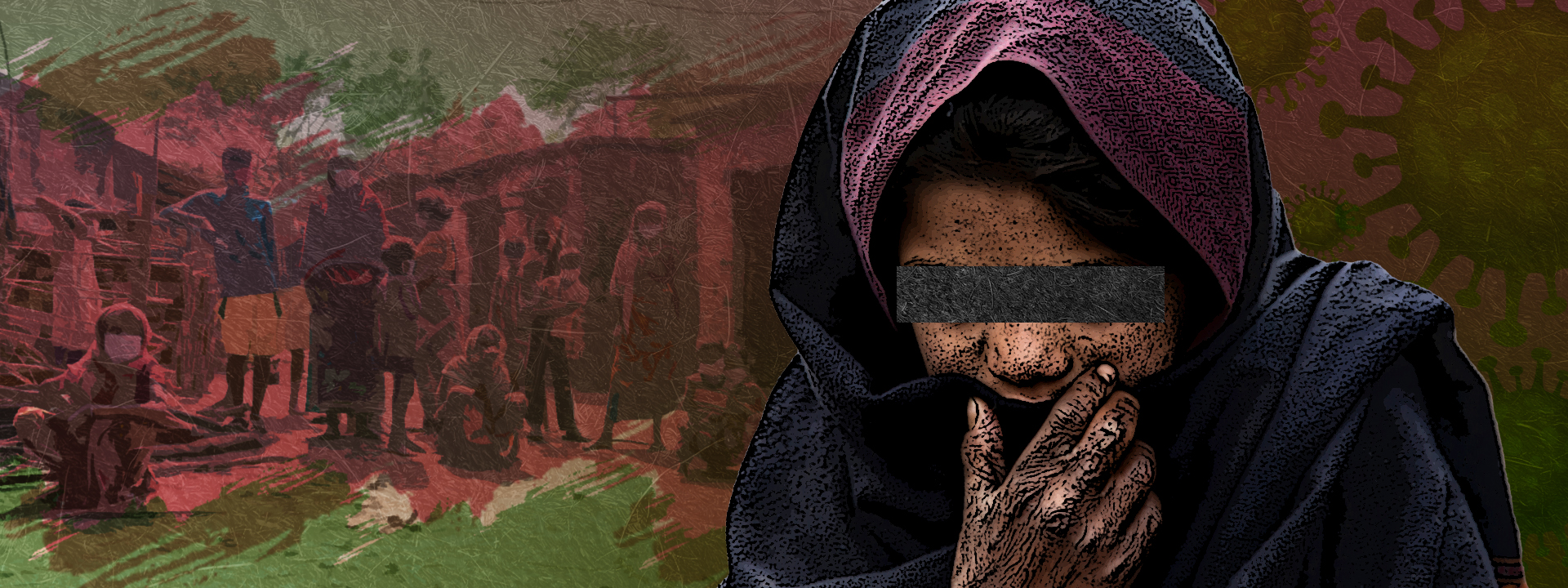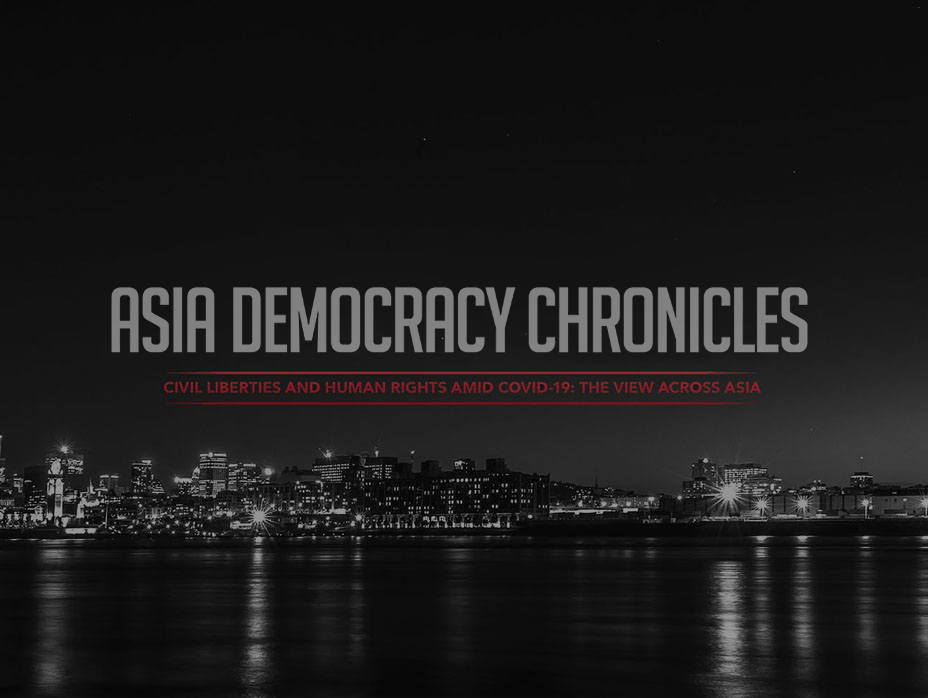When the nationwide lockdown was announced in India on March 24, 2020, many migrant workers who are also Dalits, found themselves trapped and stranded in the cities, with no source of livelihood. Radheshyam Patel, a native of Dungarpur district who was working as a daily wage earner in the state of Ahmedabad in western India, says he had to return to his village as there was no point in staying in the city when there was no income due to the lockdown.
“Most of us work in Ahmedabad at tea stalls or food joints. Since everything is shut, our employers have asked us to come back only after things get normal, as they don’t have money to pay us,” said Patel, a Dalit.
Among the four castes in India, the people categorized as “untouchables,” the Dalits, estimated to number around 200 million, suffered the worst during the pandemic. According to the 2011 Economic and Caste census, 91% of Dalits and other lower castes are landless. This forced them to leave their villages and to look for blue-collar jobs elsewhere in order to escape the system that brands them as “untouchable.”
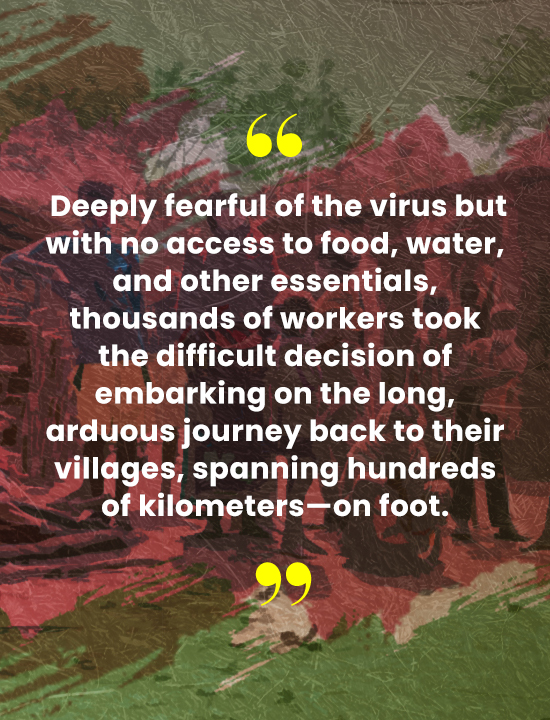 As daily wage earners, they found themselves with no savings, no work, and no provisions. Deeply fearful of the virus but with no access to food, water, and other essentials, thousands of workers took the difficult decision of embarking on the long, arduous journey back to their villages, spanning hundreds of kilometers — on foot. Most of these workers come from the states of Uttar Pradesh, Bihar, Rajasthan, Jharkhand, Madhya Pradesh, and Chhattisgarh.
As daily wage earners, they found themselves with no savings, no work, and no provisions. Deeply fearful of the virus but with no access to food, water, and other essentials, thousands of workers took the difficult decision of embarking on the long, arduous journey back to their villages, spanning hundreds of kilometers — on foot. Most of these workers come from the states of Uttar Pradesh, Bihar, Rajasthan, Jharkhand, Madhya Pradesh, and Chhattisgarh.
This gruelling exodus was tracked closely by the media, but much to the workers’ disappointment, little help was extended to them by the government. Even the responsibility of providing rations was undertaken by good Samaritans and concerned citizens. Over 300 of these workers died en route, never making it to their family homes in their villages.
Caste system – alive and well
India’s constitution provides that “no citizen shall, on grounds only of caste or race, be subjected to any disability and restriction.” However, when examined culturally, it becomes clear that, despite reforms, India’s caste system is alive and well.
The caste system—a hierarchical, rigid, and endogamous structure—divides India’s Hindus into stratified sects which are, at first glance, based on occupation. But the fact that caste is inherited and cannot be changed with the changing of one’s occupation shows that it is a discriminatory hierarchy that makes it easy to keep certain sectors oppressed.
For centuries, the Indian Hindu social structure has relied heavily on the caste system to define nearly all major aspects of an individual’s life from social interactions to economic opportunities.
Occupying the peak of this pyramid-like structure is a group called Brahmins. A number of Brahmins are supremacists who believe themselves to be superior to the rest of the caste communities. As a result, they feel entitled to the lion’s share of the nation’s power, money, and resources, much to the detriment of other communities.
Discriminations intensified
The pandemic has acted as a foil to the caste system, bringing into sharper focus the inherent discriminatory nature of the system. Lower-caste communities have faced unbearable trials, including being blamed for spreading the coronavirus. They are also being forced to do jobs that put them on the frontline without being offered any protection , and to accept inhumane living conditions, suffering humiliation and violence, as well as being denied government allocated relief and rations.
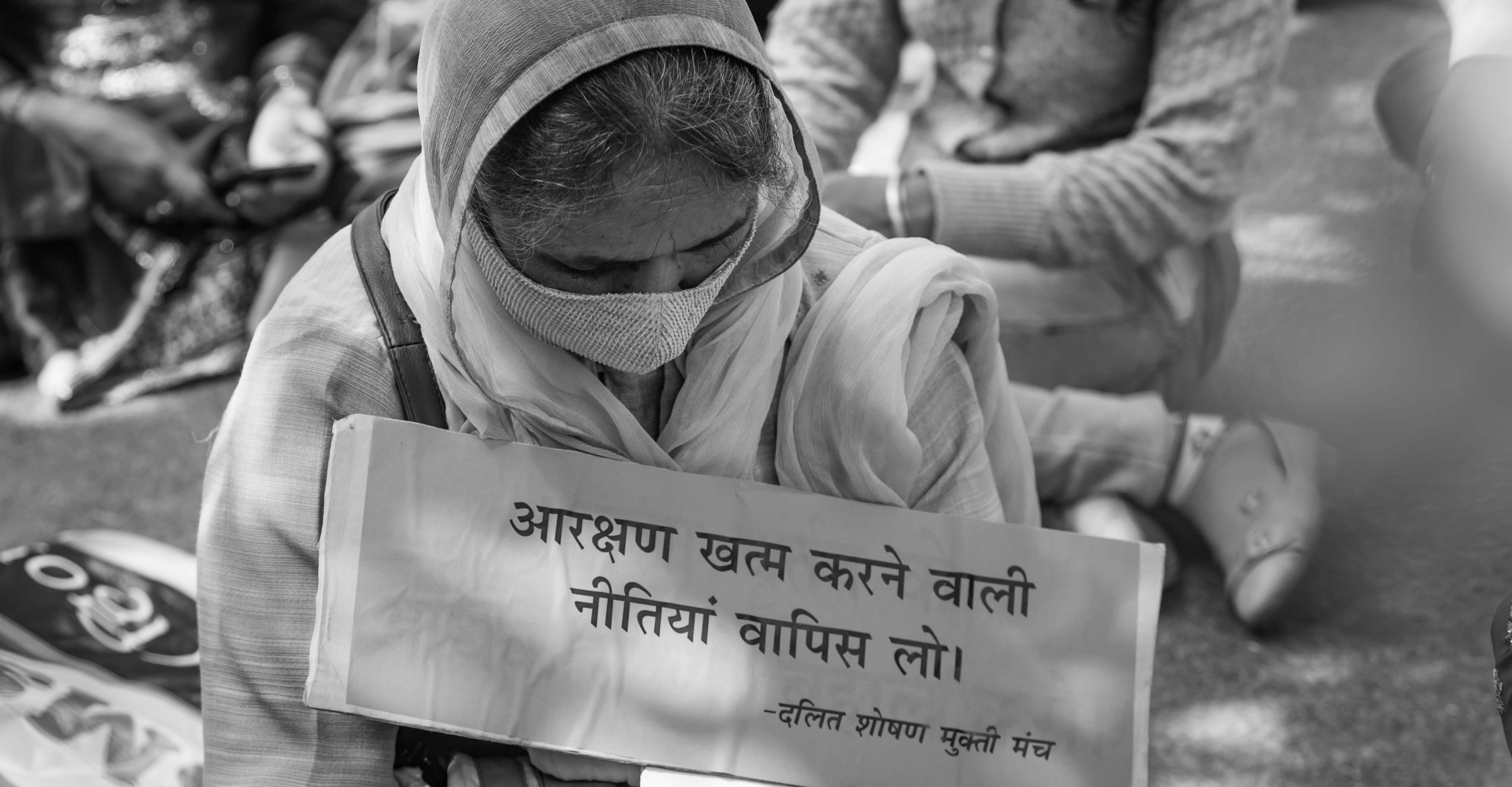
Dalits participate in one of the September protests in the northern Indian state of Himachal Pradesh, where dalits comprise 25% of the population. More details on these protests from The Indian Express here.
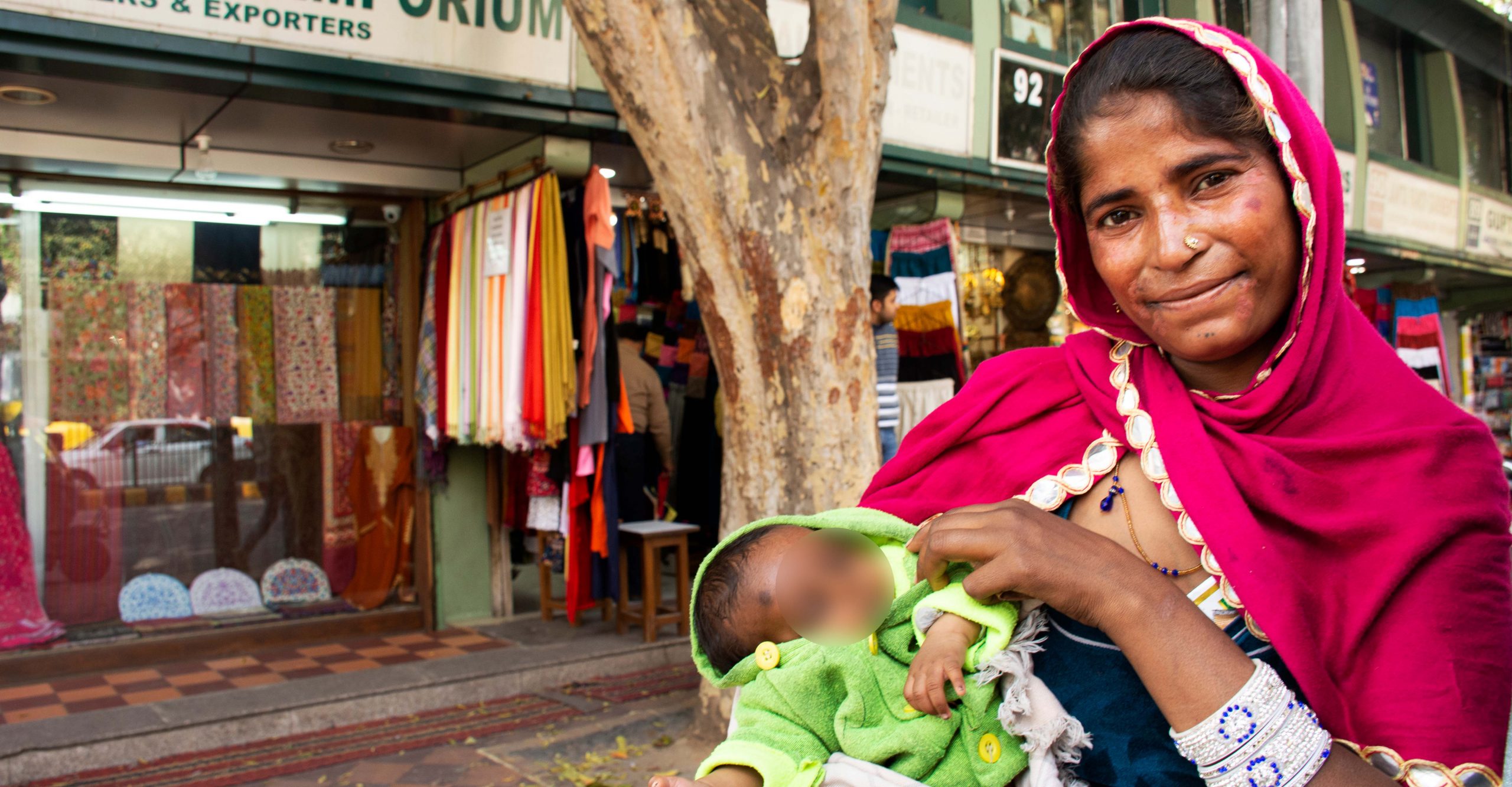
A dalit goes begging with her baby in New Delhi in March, early on in India’s lockdown.
The Dalits, although downtrodden and oppressed, are essential cogs in the wheel of India’s economy. Traditionally, they are the scavengers, waste pickers, and sewage drain cleaners – occupations which are considered “impure” and menial. These jobs leave the Dalits the most vulnerable to any illness, yet their occupations fell under the category of “essential services” during the lockdown. As a result, while the rest of the nation was advised to stay safe at home, these workers were working as usual, armed with not much more than a roughly fashioned mask.
When the fear of contracting the virus and ostracism became too heavy to bear, many of these workers joined the long trek home back to their villages. However, they did not expect to be met with an attitude of bias worse than the one they had escaped. There have been reports of assault, harassment, verbal abuse, and ostracism towards those returning home. Some workers reported starving as they were prevented by upper-caste individuals from leaving their designated areas on the outskirts of their villages to go in search of food. Many of these people got home after their arduous journey only to realize that all contractual jobs had been redistributed among upper-caste people.
Many Dalits did not receive government-sanctioned rations that had been earmarked for them. Some victims even alleged that local leaders refused to give them rations because they had not voted for them.
In some states, returning migrant laborers were herded into makeshift quarantine centers, where living conditions were extremely poor. As these quarantine facilities started to fill up, officials allowed people to leave without testing them. This was done knowing fully well that should the workers be infected, they would likely infect others in villages where healthcare facilities were virtually non-existent.
Woes compounded
In the states of Madhya Pradesh, Chhattisgarh, and Uttar Pradesh, there have been complaints made by migrant laborers alleging that village headmen, who are often upper-caste individuals, have been discriminating on the lines of caste, not allowing lower-caste people to gain employment if there was an upper-caste hopeful vying for the same job. Economically the weakest section of society even in the best of times, Dalits are now experiencing an alarming drop in income and an unprecedented rise in the loss of livelihoods.
Claiming that no government relief has reached them, many families have been compelled to take loans from moneylenders at astronomical rates of interest. There have also been reports of discrimination in relief provision. This is a worrying development, as being pushed into debt is often a cause of bonded labor and high suicide rates. These factors further alienated the lower castes, playing a role in marginalizing the community.
Unfortunately, the political leadership did little to assuage the troubles of the community. When Uttar Pradesh’s Chief Minister Yogi Adityanath, an upper-caste Hindu priest, claimed the Dalit workers were bringing the coronavirus into his state, this was seen as an attempt to vilify the lower-caste people. Soon after, police forces in a town called Bareilly accosted migrant workers trudging on foot, had them squat on the street, and hosed them down with disinfectant—an act that is both harmful and illegal.
Although it can be argued that the virus is new and not much is known about it, we learned early on that the disease, once it spreads to the respiratory system, can be transmitted from human to human through coughing and sneezing. Yet, with the introduction of the virus in India, Brahminical supremacists on social media lost no time in attaching the cause of the disease to “impure” habits like eating meat, something that is attributed to lower castes. In a further display of misinformation, there were calls to go vegetarian, as this was claimed to be the only way to gain immunity against the virus.
Bigotry and hate crimes
When Swami Chakrapani, president of the Hindu Mahasabha, a right-wing Hindu nationalist outfit, said, “Corona is not a virus but an avatar for the protection of poor creatures. They have come to give the message of death and punishment to the one who eats them,” he cemented the narrative that people of lower castes were responsible for bringing the virus to upper-caste individuals. It was unsurprising to see a sudden spike in hate crimes across the nation targeting lower-caste individuals.
Violence of this nature stems from ignorance and a deeply-rooted sense of fear. Disease fuels an atmosphere of panic which, in turn, results in the discrimination and ostracism against those who are perceived to be responsible for the pandemic. Paradoxically, it is the fear of stigmatization which encourages people to lie about their symptoms, skip quarantine, and escape from hospitals, which in turn achieves the exact opposite of trying to contain the pandemic.
The concept of social distancing, which has found appeal among the elites, triggered caste-based humiliation in lower classes. While quarantine is clearly very different from discrimination in that the former seeks to protect the one practicing it, it nevertheless looks disturbingly similar to untouchability in the way it is practised. Non-quarantined people are advised not to touch anything that a quarantined person has touched. They are ordered to avoid sharing food, stay at a safe distance from them, and sanitize their hands after coming in contact. This kind of treatment is commonplace for Dalits in villages as a matter of caste-based bigotry. For many people, the very thought that they may be treated as an untouchable acts as a significant deterrent against getting tested.
In quarantine centers in the cities, there have been disturbing reports of Dalits receiving less provisions than upper-caste individuals and Brahmins refusing to eat food cooked by Dalit workers. In villages, there have been reports of Dalits being mandatorily forced into quarantine despite their displaying no symptoms.
Decades of reforms in India have suffered a setback due to the pandemic, which has brought caste-based distinctions into even sharper focus. These discriminatory behaviors will serve to further deepen caste lines and legitimize the poor treatment of those who are seen as “lesser” human beings. Under the guise of COVID-19 precautions, supremacists have found an easy target in the vulnerable Dalits, further oppressing those who have already been pushed to the fringes of Indian society. ●
Insiyah Vahanvaty is a socio-political writer and editor who works to counter hate culture and polarization. She is also the founder of GoondaRaj, a social justice initiative and podcast.










